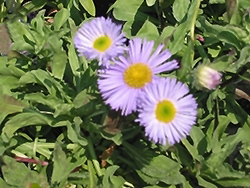Height: 12 inches
Spread: 12 inches
Sunlight:
![]()
![]()
Hardiness Zone: 3a
Other Names: Daisy Fleabane
Description:
Delicate daisy-like flowers are lavender-blue; adaptable to poor dry soils; attracts native butterflies; foliage is somewhat plain, but flowers are worthwhile
Ornamental Features
Sea Breeze Fleabane has masses of beautiful lavender daisy flowers with yellow eyes at the ends of the stems from late spring to early summer, which are most effective when planted in groupings. The flowers are excellent for cutting. Its narrow leaves remain grayish green in colour throughout the season.
Landscape Attributes
Sea Breeze Fleabane is an herbaceous perennial with a mounded form. Its medium texture blends into the garden, but can always be balanced by a couple of finer or coarser plants for an effective composition.
This is a relatively low maintenance plant, and is best cleaned up in early spring before it resumes active growth for the season. It is a good choice for attracting bees and butterflies to your yard, but is not particularly attractive to deer who tend to leave it alone in favor of tastier treats. It has no significant negative characteristics.
Sea Breeze Fleabane is recommended for the following landscape applications;
- Mass Planting
- Rock/Alpine Gardens
- Border Edging
- General Garden Use
- Naturalizing And Woodland Gardens
Planting & Growing
Sea Breeze Fleabane will grow to be about 12 inches tall at maturity, with a spread of 12 inches. Its foliage tends to remain dense right to the ground, not requiring facer plants in front. It grows at a medium rate, and under ideal conditions can be expected to live for approximately 10 years. As an herbaceous perennial, this plant will usually die back to the crown each winter, and will regrow from the base each spring. Be careful not to disturb the crown in late winter when it may not be readily seen!
This plant does best in full sun to partial shade. It is very adaptable to both dry and moist growing conditions, but will not tolerate any standing water. It is considered to be drought-tolerant, and thus makes an ideal choice for a low-water garden or xeriscape application. It is not particular as to soil pH, but grows best in poor soils. It is somewhat tolerant of urban pollution. This is a selection of a native North American species. It can be propagated by division; however, as a cultivated variety, be aware that it may be subject to certain restrictions or prohibitions on propagation.
Disclaimer - This resource is provided for informational purposes only and does NOT reflect current availability. Inventory varies seasonally, so we cannot guarantee that every plant will be in stock at all times - please contact your favourite GardenWorks location directly for current availability. It does not include our entire inventory of plants, so be sure to visit GardenWorks to see varieties that may not be represented on this list.

